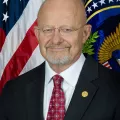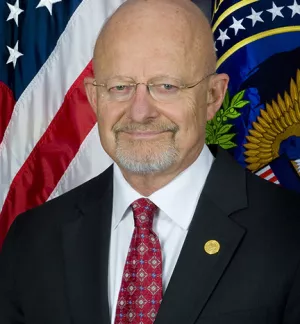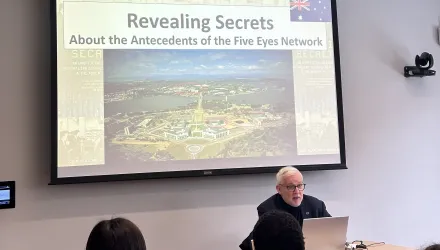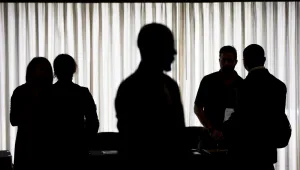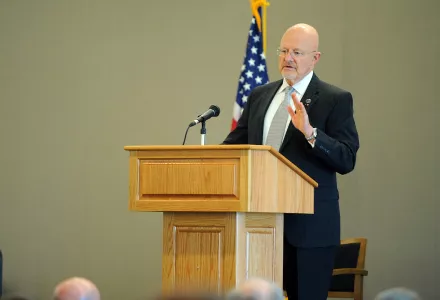
Clapper, leader in field, frets over past damage, present shortcomings, future threats
Politics can create strange bedfellows, and political scandals can create unexpected celebrities.
After a 55-year career deep inside U.S. intelligence, James Clapper has recently found something akin to notoriety, first as co-author of the famous Oct. 7, 2016, declaration that Russia was trying to tip the scales of the 2016 presidential election, and now as one of a handful of top former intelligence officials who have taken their criticisms of President Trump and concerns over a possible conspiracy with Russia to the public.
The son of a U.S. Army signals intelligence officer in World War II, Clapper carried on that service tradition by joining the Air Force in 1963, rising to lieutenant general and becoming director of the Defense Intelligence Agency (DIA) from 1992 until his retirement from uniformed service in 1995.
But Clapper’s vast expertise and respected leadership prompted both Presidents George W. Bush and Barack Obama to press him back into government service long after many of his peers had retired to work on their golf swings.
As Director of National Intelligence (DNI) from 2010 to 2017, Clapper served as Obama’s most senior intelligence adviser, facing complex and contentious intelligence and national security issues such as the Edward Snowden revelations, the U.S. embassy bombing in Libya, the raid that killed 9/11 mastermind Osama bin Laden, and the ongoing investigation into how Russia intruded on the last U.S. presidential election. Clapper retired as DNI early last year.
Now nearly 80, Clapper is a fellow at the Belfer Center for Science and International Affairs at Harvard Kennedy School. At a time when the intelligence community’s credibility is regularly questioned, Clapper’s frank new memoir, “Facts and Fears: Hard Truths from a Life in Intelligence,” delves into his vast experience on the front lines of his field.
In an interview, Clapper talked about his candid new book, about what he learned during the Russia investigation, about why he speaks out about intelligence issues, and about how the nation might best defend itself against attacks from external and internal sources.
Q&A With James Clapper
GAZETTE: You served in the U.S. government in intelligence for 55 years under every president since John F. Kennedy, but you’ve said that “hearing Donald Trump ask Russian intelligence to attack his political opponent — in a very specific, direct way — made me fear for our nation.” You don’t seem like someone who is easily rattled. What did you mean?
CLAPPER: In all that time in intelligence, in one capacity or another, I’ve seen a lot of bad stuff, but never anything to disturb me as much as what I came to understand, comprehend, what the Russians were doing to meddle in the fundamental pillars of our political system. So when [candidate Trump] was exhorting an adversary of ours — which, in my mind, is the primary threat these days — to help him by going and finding allegedly 30,000 missing emails of Hillary Clinton, that to me is unconscionable and inappropriate and unheard of. There’s no time in our history where a president has exhorted an enemy, an adversary, to help him win an election and disparage a political opponent.
GAZETTE: He later claimed he was joking.
CLAPPER: He wasn’t joking any more than he was joking that he wants American citizens to behave like North Koreans do for leader Kim Jong-un. He wasn’t joking about that either.
GAZETTE: You discuss in the book how you and other intelligence agency heads under President Obama, including FBI Director James Comey, briefed then President-elect Trump, Vice President-elect Pence, incoming national security adviser Mike Flynn, chief of staff Reince Priebus, and press secretary Sean Spicer in early January 2017 on why the intelligence community had high confidence that Putin directly ordered the hacking and election interference. Since you provided Trump the same classified assessment that President Obama received …
CLAPPER: Yes. And he had access to the very same highly classified hard-copy report, as well.
GAZETTE: So, what did you think when you first heard him publicly question that conclusion, and why do you think he continues to deny or cast doubt on those findings?
CLAPPER: What it showed me was, and he’s consistent to this day, that he could not then or now accept any information that casts doubt on the legitimacy of his election. And clearly the intelligence community assessment on the magnitude of the Russian meddling on our election — and I go ahead and make the call; I think they actually influenced the outcome — that’s just something he couldn’t accept. He was that way then, and he’s still that way. There’s all kinds of reasons speculated on why there’s deference to the Russians by him personally and to Putin personally, but I don’t know the answer to that.
GAZETTE: In hindsight, was it a mistake to provide him with detailed intelligence on what the U.S. knew about Russian interference?
CLAPPER: Absolutely not. The intelligence community should never, ever hold back any information from the president of the United States, no matter who it is.
GAZETTE: What was your reaction when you saw the Russian foreign minister Sergey Lavrov and Ambassador Sergey Kislyak in the Oval Office and learned the president had revealed classified information to them about an Israeli source?
CLAPPER: I thought it was dreadful; that was unconscionable.
GAZETTE: In a recent PBS interview, you said you now believe the Russians actually “turned” the election. What did you mean, and do you think it’s possible that they could have pulled it off without help from any U.S. persons or without the knowledge of any social media platforms?
CLAPPER: I think that because of the slim victory margin, 80,000 votes in three states, and the magnitude of what they did — the massive effort they made where they touched 126,000,000 voters, and you see examples of what they did where Americans were not aware and even denied the reality of the Russians having convened meetings in Florida, for example. I think they got people out to vote who wouldn’t otherwise have voted, and certainly reinforced votes. They appealed to every group in this country, whether it’s Black Lives Matter, white supremacists, pro-Muslims, anti-Muslims, pro-gun control, anti-gun control, and they deliberately tailored compelling messages in a very sophisticated way, in a multidimensional way. That is unprecedented. It’s only an informed opinion, that’s all it is, because in the intelligence community assessment, we did not make any call on the impact of Russian meddling on the election outcome. The intelligence community is not chartered and has no resources to do that. But as a private citizen, knowing what I know now since I left the government, and knowing what I knew before I left, that’s a conclusion I came to.
GAZETTE: By December 2015, you write that it was clear to U.S. intelligence that Russia had shifted from attempting to damage Hillary Clinton’s chances and undermine faith in the U.S. electoral process to supporting Trump’s candidacy. You point to a number of examples during the 2016 campaign where Russia initiated and pushed certain themes and messages about Clinton and Trump, and then the Trump camp almost immediately echoed the language and messaging. … I know you’ve said you saw “no evidence of collusion,” but does behavior that appears coordinated suggest anything to you?
CLAPPER: There’s a striking parallelism between what the Russians were doing and saying and what the campaign was doing and saying, particularly when it came to Hillary Clinton, both from the standpoint of her alleged scandals and her alleged maladies, both physical and mental. Now, do I have direct evidence that someone in the campaign was coordinating messaging with the Russians? No, I don’t. But the outward symptoms are curious. Some would argue that Trump exhorting the Russians to go find Clinton emails to help him is a form of collusion.
GAZETTE: You say you were “not surprised” that Republican Majority Leader Mitch McConnell and House Speaker Paul Ryan refused in late summer 2016 to issue a bipartisan public statement on Russia’s election interference. “It seemed they had decided by then that they didn’t care who their nominee was, how he got elected, or what effect having a foreign power influence our election would have on the nation, as long as they won,” you write. As someone who regularly studies people’s actions and motivations, did you or anyone look into why that was?
CLAPPER: What they cared about was their almighty agenda, which is still the case. And you have to ask, when will Republicans, particularly the Republican leadership, say in response to some additional Trump excess like separating kids from their parents at the border, when will they say, “Enough”? That’s really the issue here. I don’t know. What’s more important to them is their agenda: getting judges appointed, tax cuts that benefit the wealthy, etc., etc.
GAZETTE: Has it been tough for you, knowing what you know, to be sitting on the sidelines?
CLAPPER: Actually, I’m in a better position to do something about it now than I was then — writing the book, speaking out on television, and having far more public impact than anything I did as DNI. And I have far more notoriety now than I did as DNI. It’s liberating because when you’re in the government there are lots of constraints on what you can say and where you can say it.
GAZETTE: We know from public reporting that the FBI had been concerned that Russian intelligence officers were attempting to infiltrate the Trump campaign and made numerous contacts with various campaign figures, including advisers George Papadopoulos and Carter Page, the president’s son and son-in-law, Donald Trump Jr. and Jared Kushner, and his campaign chairman, Paul Manafort. Last December, you called Putin “a great [KGB] case officer” who “knows how to handle an asset, and that’s what he’s doing with the president.” You clarified that to say you meant that figuratively, but could you elaborate on what led you to make that comparison?
CLAPPER: He’s a [former] KGB officer, that’s what they do. It’s in their genes. … So, what he tries to do is, when he approaches Trump or anybody else, he’s going to approach it the same way he approached it for his professional career. How do I exploit this person? How do I gain leverage? How do I gain influence? How do I co-opt them? That’s the way they do business, and have since the Soviet era. And what Putin figured out was the way to get to him was through his ego.
GAZETTE: If there were evidence that members of the Trump campaign aided Russia’s efforts to damage Hillary Clinton’s candidacy or accepted help from Russia or China or Israel or all of the above to swing the election in Trump’s favor, where would that rank in the history of threats to the U.S.? That would seem to be a pretty major threat to our country.
CLAPPER: It would be, absolutely.
GAZETTE: How concerned are you that we don’t appear to be doing anything as a country to protect ourselves from further election interference from Russia and others? What do the trendlines look like?
CLAPPER: Very [concerned]. Lots of things are going on, I’m sure, at the local, organization-by-organization level, the Department of Homeland Security, the FBI. They’re all doing their thing. State and local officials are doing what they can to secure the voting apparatus to include registration rolls and all of that. I suspect, not knowing inside baseball, it’s uneven from state to state. So things are going on. But what’s missing is the galvanizing effect of a clear stalwart statement from the president of the United States that the Russians are messing with us and it’s got to stop. And this needs to be done not just for the government, but for the society.
GAZETTE: Russian intelligence has a long, well-known history of infiltrating and attacking its adversaries, including the U.S., using and reusing many of the same tactics: disinformation, provocation, compromise, honeypots, etc. Why hasn’t the U.S. done a better job shutting these methods down?
CLAPPER: They work at it very hard, and we don’t do what we should do to counter it. For example, the U.S. Information Agency, which is an organization that was up and running during the heyday of the Cold War to counter-message Russian propaganda, we need something like that, but on steroids, to do the counter-messaging and, if nothing else, to point out what the Russians are doing and saying, and how they’re doing it, and to get the message across that people shouldn’t believe everything they hear and see.
GAZETTE: The DNI as an organization is better today than it was in 1963 when you started as a signals intelligence officer, you say. But are we safer as a country, especially with regard to intelligence threats from Russia and China? What are the things going on over the next few years, and are you concerned at all?
CLAPPER: We’re safer, from an intelligence standpoint, particularly from the external threats. I think there’s excellent insight into what the Russians and the Chinese are doing. I view the Russians as short-term. At least for the next six years, as long as Putin’s in office, we’re going to be in a bad place with Russia and it will continue to be our primary adversary, an existential threat to this country. Long-term, it’s China because of its economic power and its prowess in science and technical matters.
GAZETTE: Sir David Omand, a former head of Britain’s Government Communications Headquarters, was at the Kennedy School last spring talking about how democratic societies in the digital era are more vulnerable than ever before to manipulation through the classic tools of subversion, things like propaganda, intimidation, and dirty tricks. Through social media, foreign actors are able to engage in subversive and seditious activities today with unprecedented scale and ease. He said one strategy intelligence communities will need to adopt to counter these efforts is to give up the desire for total secrecy and be more open to educating the media and the public about the nature of existing threats. After 2016, do U.S. intelligence agencies need to become more outward-facing than they’ve been, and what can they realistically do without jeopardizing valuable sources and methods?
CLAPPER: That’s exactly the point. There’s always going to be an aura of mystery and suspicion about the intelligence community because internally what it does has to be secret to protect sources and methods and tradecraft. I did a lot of things while I was DNI after Snowden to be more transparent, particularly about the Foreign Intelligence Surveillance Court. But when you talk about intelligence, adversaries go to school on that very same transparency, so there’s a double-edged sword there, and you have to engage the risk-vs.-gain thing. And it could be not just nation-states, but non-nation-states as well.
GAZETTE: How have the public attacks on the intelligence agencies by the president and his supporters over the last two years affected morale in them? Are the attacks doing long-term damage?
CLAPPER: I don’t know about long term, I can’t say. I think right now the intelligence community is not in the crosshairs. The criticism is focused more on the FBI, regrettably, and the Department of Justice. So I think the intelligence community, as long as it has leadership that will provide the top cover, will be OK and will keep serving up the truth to power whether they’re powerless in the truth or not.
This interview was edited for clarity and length.
Pazzanese, Christina. “The Worries Over U.S. Intelligence.” Harvard Gazette, June 22, 2018
The full text of this publication is available via Harvard Gazette.

